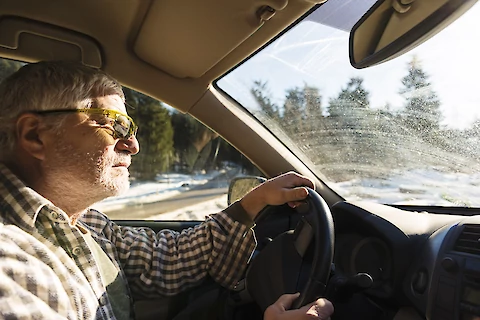
The winter season can sometimes be a challenge to everyday driving, especially for seniors. Daylight is limited, the roads can be icy, and frigid temperatures in the Milwaukee area can impact how we drive.
Getting around comfortably and safely requires common sense preparation. Making sure you and your vehicle are ready for the unpredictability of winter roads is a good place to start. Here are five tips to help make winter car rides easier and safer for seniors.
Planning Ahead Can Make All The Difference
One of the most important things seniors and their loved ones can do before leaving home to navigate the winter roads is to plan ahead. Check the local weather report on TV or the Internet and consider postponing a road trip if conditions are not ideal. If traveling is still necessary, be sure your car is mechanically winter-ready. Regular servicing to ensure your vehicle is winter road-worthy is the number one way to ensure driving safety. Rear-wheel drive vehicles might also benefit by adding weight to the trunk for better traction on slippery streets.
Equip the Car With the Right Supplies in Case of an Emergency
Even though a roadside emergency might never occur, being prepared for a breakdown or a surprise snowstorm is smart. Seniors should carry a fully-charged cell phone at all times. Warm clothing, a blanket, food, and water are basic supplies to have on hand before any winter journey begins. Keep must-have medications on hand and don't forget to bring an adequate snow scraper to store in the back seat. AAA recommends making sure gas tanks are at least half full before venturing out in the winter months.
Know How to Drive in Less Than Ideal Conditions
It is a good idea to encourage seniors to learn about snow-smart driving techniques when on the road. This includes taking it slow when accelerating or braking to avoid skids and optimize traction. Stopping at stop signs or lights is especially challenging for everyone when the roads are slick. A slow approach is always best. Seniors might also want to plan trips for the daylight hours when visibility is better. And don't forget to wear a seat belt. It is the simplest step you can take for staying safe on the road.
Avoid Rush Hour Traffic and Back Roads
The more cars there are on the road, the greater the chance is for traffic accidents. Avoiding driving during peak rush hour times eliminates the stop-and-go of frustrating traffic jams and the potential for wrecks. Black ice is responsible for many traffic incidents during the rush hour commute and seniors should be aware of this invisible threat. It is also important to stay off of back or shortcut roads when the roads are bad. These Wisconsin byways are less likely to be salted or plowed because of the lack of traffic and can prove more dangerous than more traveled roads.
Consider Traveling With a Companion
Solo travel has its perks but bringing along a traveling companion is wise, especially when the weather is bad. Not only is it more enjoyable to have company and conversation while you drive, but an extra pair of eyes can also help you navigate slippery winter roads. If you are planning to take a longer trip, the two of you can take turns driving. Winter car rides are safer and more comfortable when you take the time to be prepared and choose to ride along with friends, family members, or caregivers.
Senior Helpers Milwaukee is your number-one resource for finding the best in quality in-home care for you and your loved ones. Our personalized services are available in the Milwaukee, Glendale, Brookfield, and Germantown areas. You can contact us anytime and let us know what we can do for you.